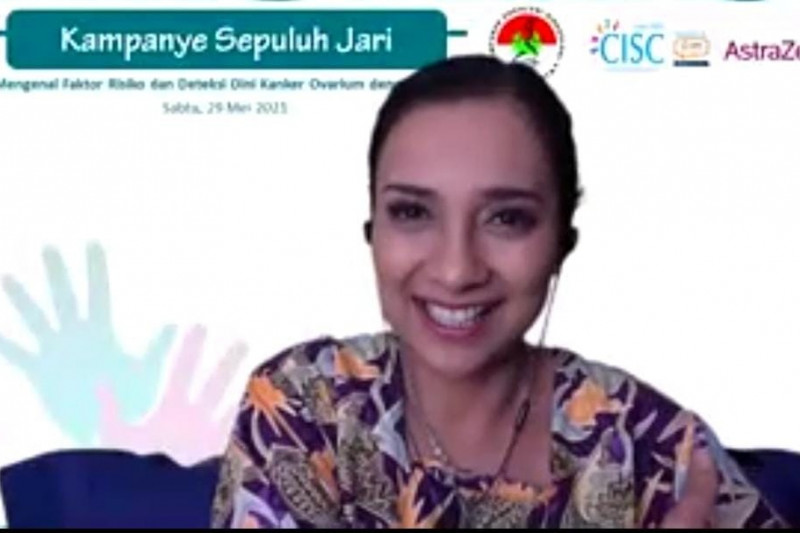My number three son is an artist, just like his father, he also has to keep moving
Jakarta (ANTARA) – After two decades as an ovarian cancer survivor, celebrity Shahnaz Haque revealed that his lifestyle has also changed to become much healthier.
Shahnaz, who was diagnosed with ovarian cancer in 1998, admitted that he didn’t really care about his health. He recalls that work flooded in, making him too busy to maintain a lifestyle.
“Now I don’t eat food in cans, I cook, cooked food (wasted immediately) not back and forth in the refrigerator and heated,” said Shahnaz in a health webinar, Saturday (29/5).
A good diet and exercise are applied to this day, something that was also taught to his three daughters since childhood. He instills an understanding of healthy living for one’s own good. He chose this step because the risk of developing ovarian cancer is greater if there is a family history of ovarian or breast cancer. Meanwhile, Shahnaz’s mother and grandmother died from cancer, as did her in-laws who died from prostate cancer and breast cancer.
Also read: Shahnaz Haque’s struggle with ovarian cancer
“I tell my kids that pain doesn’t feel good. So they know if they want to try something risky, they have to know how to deal with it,” explains Shahnaz.
So, if there is still an urge to eat unhealthy foods and increase the risk, then there must be awareness that this temptation can lead to the disease that is the 8th leading cause of cancer death in women worldwide.
She is grateful that her children consciously maintain a healthy diet and are active. His eldest daughter is an athlete softball which is now in Canada. In the midst of a pandemic, the eldest continues to practice by implementing health protocols. As an athlete, automatically a healthy diet is always followed. The same thing was experienced by his second daughter who became an equestrian athlete.
“My third child is an artist, just like his father, he also has to move on. The family’s lifestyle depends on a mother. Children will imitate, so we need to improve ourselves first,” he said.
Talk of cancer flows naturally within the Shahnaz family. He invited his three daughters to understand the matter.
Also read: Shahnaz Haque says the vice presidential debate will be more exciting
“I don’t want to scare my children, they can’t choose their ancestral history, but they can choose how to live their lives if they recognize the risk factors and signs that occur in the body.”
Usually, ovarian cancer is not accompanied by symptoms in its early stages, so it often goes unnoticed and is only discovered when it has reached an advanced stage, something experienced by mothers and grandmothers. Only 20 percent of ovarian cancers are detected at an early stage, 94 percent of these early-stage patients will be able to live more than 5 years after being diagnosed.
In her case, she felt lucky that the cancer was detected early because she had not had her period for a while even though she was not sexually active.
After checking in, the doctor said he needed surgery. Fear made him delay for up to a year until the symptoms worsened. Defecation becomes increasingly difficult, the frequency of urination becomes more frequent and back pain. The pain even made it difficult for him to walk. After that, Shahnaz returned to the doctor and ventured to undergo surgery in 1999.
“My advantage is that I didn’t try alternative medicine. After I finished fighting as a survivor, I always told cancer fighters that it was a medical disease, not a disease, so don’t go to a traditional healer,” he said.
Also read: Shahnaz Haque excited for a photo with badminton athlete Anthony Ginting
Shahnaz insists cancer is not the end of everything. Join a community that can share positive energy because positive thinking is also important in the healing process.
Indonesian Oncology and Gynecology Association (HOGI), Indonesian Cancer Information & Support System (CISC) together with AstraZeneca launched the 10 Fingers Campaign to identify six risk factors and four signs of ovarian cancer. Six risks of ovarian cancer, namely a history of endometrial cysts, having a family history of ovarian cancer and breast cancer, experiencing genetic mutations (eg BRCA), low parity rates, poor lifestyle and increasing age. While the four signs of ovarian cancer are bloating, decreased appetite, frequent urination and pelvic or abdominal pain.
“Paying attention and checking the 10 things in the 10 Finger Campaign is an important effort so that Indonesian women are free from the threat of death from ovarian cancer. I invite Indonesian women to equip themselves with information from trusted sources, one of which is information in the 10 Finger Campaign,” said Shahnaz.
Ovarian cancer affects many women in the world. The lack of information and public knowledge about ovarian cancer, compared to breast cancer or cervical cancer, which includes cancer in women, is one of the obstacles to prevention and early detection efforts. In fact, ovarian cancer is the 8th leading cause of cancer death in women worldwide. In Indonesia, ovarian cancer is ranked 3rd in terms of incidence and mortality rates for cancer in women.
Also read: Shahnaz Haque doesn’t have to worry about Eid without ART
Also read: Having a history of cancer, Shahnaz Haque invites his family to live a healthy life
Reporter: Nanien Yuniar
Editor: Suryanto
COPYRIGHT © ANTARA 2021
–


